#richard neville earl of warwick
Text
Personal relationships within the political arena were not simply a complicating factor to be minimised if possible. On the contrary, it was received wisdom that they should be strengthened. Social or political ties would be made stronger by their transmutation into affection. 'Obeissance done for love is more steadfast than that which is done for lordship or for dread.' This did not mean that such affection was essential, only that without it something was lacking. The chronicler John Warkworth, describing the progressive breakdown of relations between Edward IV and the earl of Warwick from the mid 1460s, commented simply 'And yet they were accorded [brought to agreement] divers times, but they never loved together after.’ Where it could be achieved, the transmutation of obedience into love was one step on a ladder from self-interest to the creation of an ordered world: 'Largesse engenders familiarite, that is true service; true service engenders friendship; friendship engenders counsel and help; by these things is all the world made stable.'
Rosemary Horrox, "Personalities and Politics", The Wars of the Roses (Problems in Focus), edited by A.J Pollard
#'they never loved together after'#medieval#english history#edward iv#richard neville earl of warwick#my post#queue
12 notes
·
View notes
Text
“An indication of how much influence Warwick expected to have over the king is that the earl attested no fewer than forty-one of the forty-six charters issued by Edward between 1461 and 1464”
- C Carpenter, The Wars of the Roses: Politics and Constitution in England, c.1437-1509
#and it is indeed how she says: all that and he wasn’t even a household member like Hastings!#freaking Warwick be mad#richard neville earl of warwick#edward iv#wars of the roses#christine carpenter#quotes
7 notes
·
View notes
Text







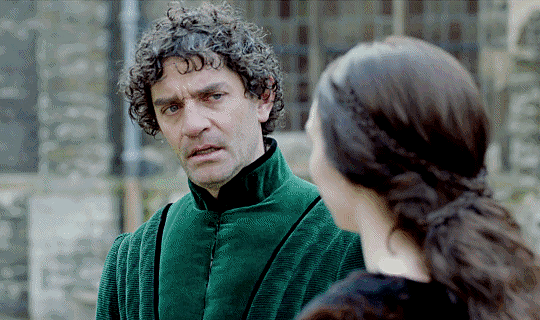


THE WHITE QUEEN 10-YEAR ANNIVERSARY WEEK
Day Two - Favourite Villain: Richard Neville, 16th Earl of Warwick
#the white queen#twq#twqedit#perioddramaedit#perioddramasource#weloveperioddrama#perioddramagif#twq10#filmtvcentral#smallscreensource#cinematv#showedit#tvedit#james frain#earl of warwick#richard neville#my edit
131 notes
·
View notes
Photo

"They tell me they have but two rulers in England. Monsieur de Warwick is one; of the second I have forgotten the name."
#the wars of the roses#15th century#middle ages#artists on tumblr#digital art#illustration#sketch#art#character design#edward iv#elizabeth woodville#elizabeth of york#henry vii#henry vi#margaret of anjou#richard neville#earl of warwick#anne beauchamp#isabel neville#richard iii#george of clarence#medieval fashion#the white queen#the white princess#house of york#medieval manuscript#plantagenets
64 notes
·
View notes
Text

Which movie they went to see on July 21
#richard plantagenet#richard iii#edward iv#henry vi#george plantagenet#edward of lancaster#henry stafford#duke of buckingham#elizabeth woodville#anne neville#isabel neville#margaret of anjou#earl of warwick#edward of middleham#elizabeth york#James tyrell#king richard iii#requiem of the rose king#baraou no souretsu
11 notes
·
View notes
Text

#this manga is making me climb the walls#Requiem of the Rose King#baraou no souretsu#spoilers#Earl of Warwick#Richard Neville#aesthetic inspo#Aya Kanno#obsessed with this page
30 notes
·
View notes
Text
When we think about the Wars of the Roses, it is easy to seal them off, as if the in the infighting of an extended English aristocratic family had nothing to do with the outside world. It has begun to be accepted that the conflicts did move and involve popular opinion. The wars may have been ‘just’ a clash of dynasties or aristocratic power games, but without people willing to fight in those causes, they could not have happened. The European dimension to the wars, however, is still too easily marginalized. And yet the end of the Hundred Years War provided the backdrop to the first blows of the conflict, Burgundy and France provided refuge from it, and crucially, neither Warwick’s campaign for the Readeption nor Edward [IV]’s attempt to snatch back the crown could have been launched without continental help, from France and Burgundy respectively. Add to that the influence of Hanseatic shipping, the importance of the two Margarets, of Anjou and of Burgundy, to Lancastrians and Yorkists respectively, and the sporadic involvement of the Scots, and it becomes clear that the Wars of the Roses were an extended episode in a European conflict, not just a murderous private dispute.
— David Horspool, Richard III: A Ruler and His Reputation
#pollard has also pointed this out#wars of the roses#late medieval#edward iv#margaret of anjou#richard neville 16th earl of warwick#margaret of york
41 notes
·
View notes
Text
Requiem of the Rose King: The Queen and the Rose Knight chapter 12 - Margaret & Henry
DO NOT REPOST OR UPLOAD ELSEWHERE! This is a fan translation. I apologize for any mistakes in my translations. I tried my best! Please show your support to Aya-sensei by purchasing her manga!
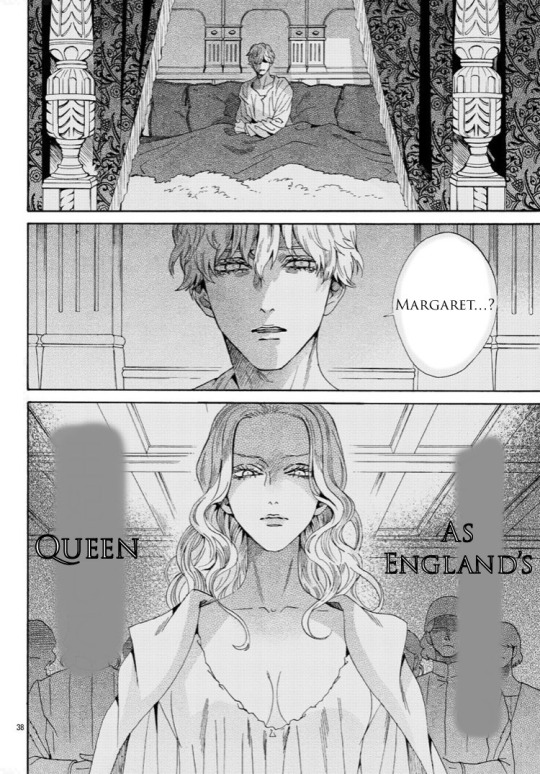



Aya-sensei has wrapped up Margaret’s story, and she absolutely delivered in this final chapter. I was rather curious if we would get to see this scene between Margaret and Henry, and how Prince Edward of Lancaster was conceived. Only for the sole purpose of maintaining Lancastrian rule, and keeping York far, far away from the crown.
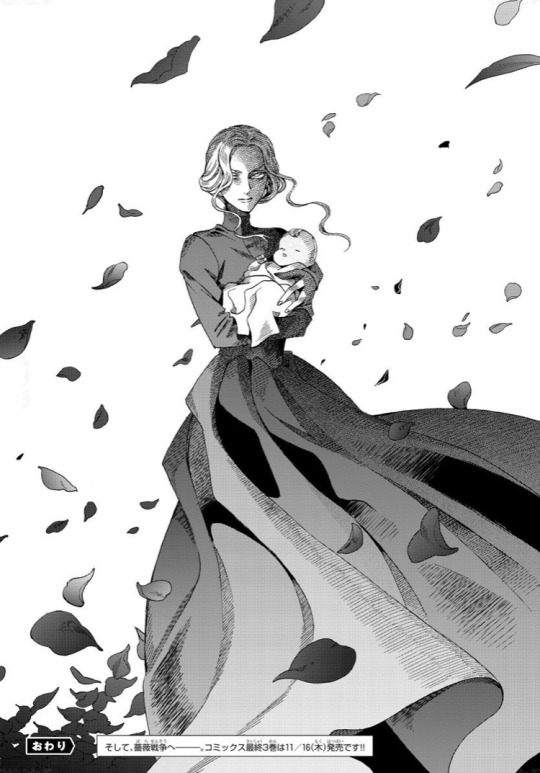
My only gripe with this arc is that we do not see Suffolk’s head roll. Margaret does confess her feelings, they share a kiss, and she sees him off. But, as Warwick mentions, his head will indeed roll. Somerset is next on the list.
I hope we get an English translation of this story soon. She isn’t my favorite, but I did enjoy seeing Margaret grow into the cold, calculating queen we know her as in the main story. Loved seeing all the new characters especially William, the Duke of Suffolk.
As of now, I think Aya-sensei is getting ready to focus on a Whitey arc? I think that’s what I saw last update. Correct me if I’m wrong. But, she has a lot to work with, and I know fans absolutely loved Somerset, so maybe we could get stories with him? Any ROTRK guy catch your interest? Aside from the popular characters, of course.
#requiem of the rose king#requiem of the rose king gaiden#薔薇王の葬列#the queen and the rose knight#margaret of anjou#henry vi#richard of york#richard neville#earl of warwick#somerset#translations not 100% accurate
3 notes
·
View notes
Text
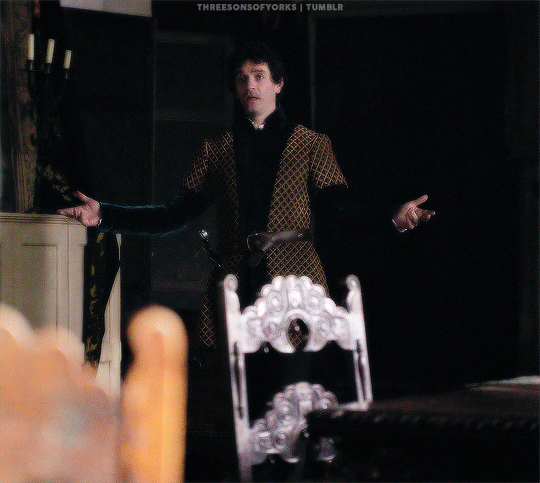


JAMES FRAIN as RICHARD NEVILLE, 16th EARL OF WARWICK
in THE WHITE QUEEN (2013) | 1x02
#this could easily be TC announcing Elizabeth's birth to HVIII#GUESS WHAT YOUR MAJESTY... IT'S A GIRL#james frain#richard neville#jamesfrainedit#richardnevilledit#the white queen#period drama#periodramaedit#weloveperioddrama#onlyperioddramas#mine#twqedit#15th century#house of york#byfefa
77 notes
·
View notes
Text

1455 05 22 Saint Albans - Graham Turner
On the 22nd May 1455, the struggle for control of the government of England boiled over into armed conflict in the first battle of what would become known as the Wars of the Roses. The following thirty years would see the throne itself become the prize for the rival Royal houses of Lancaster and York.When King Henry VI regained his sanity in January 1455, the Duke of York`s brief protectorate came to an end and his chief rival, the Duke of Somerset, regained his position of influence at court.York withdrew to the north and began mustering men, supported by his brother in law, the Earl of Salisbury, and Salisbury`s son, Richard Neville, the Earl of Warwick, later known as the `Kingmaker`.Advancing towards London, the Yorkist force found the Royal army positioned in the small town of St. Albans. When negotiations for the Duke of Somerset's surrender broke down, York`s men stormed the town`s defences while Warwick broke into the market place through alleys and gardens, attacking the Lancastrian centre.Graham Turner`s painting dramatically recreates the scene as Warwick's men, wearing their red liveries and badges of the Bear and Ragged Staff, advance through the medieval market place, while the 'Kingmaker', in the latest Milanese armour, raises his visor to greet the Duke of York. York, with his Standard bearer beside him, is indicating in the direction of the Castle Inn, site of Somerset`s last stand, and the Abbey towers over the proceedings as it still does today.
21 notes
·
View notes
Text
But the children had been within one another's orbits since birth. Leicester's detractors subsequently presented him as an arriviste, an opportunist who had risen to power clutching at the skirts of the queen, but, like so much of what was written about their relationship, this was simply untrue. Through his grandmother Elizabeth Grey, Leicester was descended from the thirteenth Earl of Warwick, the father-in-law of Richard Neville, known as the 'Kingmaker', the puppet master of the Wars of the Roses: in his family tree twined the great magnate houses of the period-- Neville, Talbot, Beauchamp, Lisle.
Elizabeth: Renaissance Prince (Hilton, Lisa)
15 notes
·
View notes
Text
“There was panic in London. Two letters were read out to the city council. One was from Edward (IV), ordering the authorities to take Henry VI into custody; the other from Warwick, telling them to hold the city against Edward at all costs. The council dithered. Hearing the news the city’s mayor John Stockton, who some six weeks previously had decided that discretion was the better part of decision-making and had ‘feigned himself sick for fear of ministering of his office’, remained in bed.”
-Thomas Penn, "The Brothers York: An English Tragedy"
Everyone say hi to John Stockton, the most relatable figure in the Wars of the Roses
#Edward IV: 😠🖕🏻🤬#Warwick: 😡🖕🏻😤#John Stockton: 😴😴😴#this is exactly what I would do if I had to deal with these idiots#and by 'these idiots' i mean every single player in the Wars of the Roses#edward iv#richard neville earl of warwick#the wars of the roses#15th century#english history#john stockton#henry vi#(not sure if i should tag him but he's technically involved in this so 🤷🏻♀️)#queue#(honestly Penn's books ARE very informative and kinda funng. unfortunately they're also very sensationalistc graceless and misleading)#my post
7 notes
·
View notes
Text
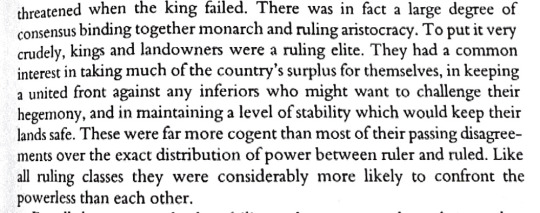
- Christine Carpenter, The Wars of the Roses: Politics and the constitution in England, c.1437-1509
#that was until#george of clarence#and#richard neville earl of warwick#came along#AKA#carlo ziglio#lord warwicj#we are so used to reading about factionalism#that we forget quite how subversive treason and regionalism was#christine carpenter#george duke of Clarence#richard neville 16th earl of warwick#lord warwick
5 notes
·
View notes
Note
Is Richard iii a hypocrite for decrying his brother’s “lack of virtue” and hailing his own virtues when he at the time of his brothers death had at least two illegitimate children? Or did it not count because of the patriarchal norms for men that richard had more of a virtue for the time than Edward and his court had?
Well, first of all, it isn't an either/or binary. Neither of these men was a saint, and neither was Satan. So let's start there.
Based on what we can glean from the available records, Richard of Gloucester had two illegitimate children, both of whom were in their mid-to-late teens when he died in August 1485. That means both of them were likely born no later than 1470, since that was the year Edward IV was kicked out of England, and Richard accompanied him to Burgundy. It's possible that the younger of those children could have been born as late as 1471, but even that is pushing it a little.
In any event, Richard was, at the time, an unmarried man. We don't know the exact date of his marriage to Lady Anne Neville, the extremely wealthy co-heiress of the late Richard Neville, earl of Warwick, but scholars have generally agreed that they married at some point between spring 1471 and late 1472 based on the date of their son's birth. As far as we can see, there are no indications that Richard fathered any illegitimate children while he was married.
That is definitely not the case with Edward IV. Alongside his ten legitimate children with Elizabeth Woodville, we find records of at least three illegitimate children. Elizabeth, who became Lady Lumley; Arthur, who became Viscount Lisle; and Grace, whose only appearance in the historical record is as one of the few attendees of Elizabeth Woodville's funeral i 1492. This is in addition to the many, many rumors, speculations, and reports of his frequent womanizing. It was not a secret that Edward IV liked the horizontal tango. A lot.
Which is all to say that when Richard brought up Edward's philandering ways, it wasn't a charge that was going to surprise anyone, and I don't really think it had much, if any, bearing on the success of his usurpation. He had greater success playing on the fears of an unknown teenaged monarch after half a century of civil war, and on the story of Edward IV's alleged pre-contract with Lady Eleanor Butler that invalidated his marriage to Elizabeth and de-legitimized all their children. The rumors regarding Edward's dissolute lifestyle were incidental to the larger point.
#15th century#england#richard iii#edward iv#elizabeth woodville#wars of the roses#yorkist shenanigans
18 notes
·
View notes
Photo
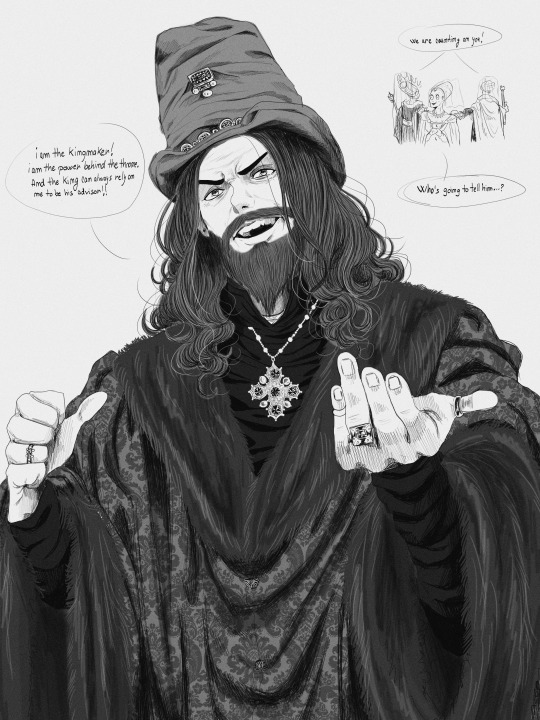
I don't know at all how Warwick's appearance was and the manuscripts do not help at all to individualize him. So I thought I'd propose my version of Warwick. Which gave me the chance to try something new in terms of clothing.
Even if this Warwick doesn't have any element from a portrait, I made sure that this element will be found in the sketch of his ladies, hihi.
#the wars of the roses#15th century#middle ages#artists on tmblr#brittish history#digital art#illustration#sketch#art#character design#edward iv#elizabeth woodville#elizabeth of york#henry vii#henry vi#isabel neville#anne neville#richard neville#earl of warwick#anne beauchamp#the nevilles#plantaganets#medieval fashion#the white queen#the white princess#house of york#richard iii#george duke of clarence#henry v
47 notes
·
View notes
Note
What are the famous rumors about Margaret of Anjou and her son Edward? How exactly did house of york attack them?
The most famous contemporary rumours are:
She was an adulteress
She cuckolded the king
Her son was actually bastard
Her armies were full of violent, rampaging foreigners who had left a trail of devastation behind them
She had no loyalty to England itself, had promised Scotland Berwick-Upon-Tweed and France Calais
She was entirely responsible for the handover of Maine and Anjou to the French
We know that the Yorkists spread rumours of her adultery and the bastardy of her son. Georges Chastellain explicitly names Richard Neville, Earl of Warwick as the source of the specific story Margaret had an affair with a wandering player who was the father of Edward of Lancaster. The rumours about Edward of Lancaster's bastardy came at a time where Henry VI was within Yorkist hands and Margaret and the Prince were at liberty, i.e. the active threat against the Yorkist regime. When York had Henry VI disinherit Edward, it was in his best interest to denigrate Edward so to present him as an undesirable alternative to York.
The rumours of Margaret's adultery had a two-fold purpose. First, they presented Margaret as a subversive, untrustworthy, immoral figure who would not submit as a woman "should" and would foist a bastard on the throne, threatening the dynasty. Second, they attacked Henry VI by showing him as unable to control his wife. If he could not "rule" his wife, how could he rule the kingdom? He was a weak king who would raise another man's son to be king and thus was not fit to wear the crown at all. The reality is that beyond these rumours with clear propagandic and political value for the Yorkists, there is very little evidence that Edward of Lancaster was illegitimate or that Margaret had committed adultery. Certainly, around the time Margaret's pregnancy was confirmed, Henry VI and the nobility behaved as if she was pregnant with his son, and after his birth, there is no suggestion that nobility had suspicions of Margaret's adultery or Edward's illegitimacy. Indeed, he was almost immediately invested as Prince of Wales. Henry VI was unwell and unable to recognise his son immediately but did so immediately on his recovery. The story that he claimed Edward was the son of the Holy Spirit is a sceptically recorded rumour and we should treat it as such.
The accounts of Margaret's rampaging army of evil foreigners are exaggerated, unable to be backed up by surviving contemporary evidence according to B. M. Cron. Likely, the stories were exaggerated by those in the Yorkist camp to discourage various towns from admitting her. Her failure to gain admittance to London, which refused her entry on the basis of such rumours, was effectively the undoing of the Lancastrian effort to secure the throne after their initial victories. The stories she was going to hand over Calais and Berwick to the French and the Scots may have had some basis in truth but we must remember she was in little position to negotiate, and whether she intended to honour these promises is impossible to known. On a similar note, the hand over of Maine and Anjou was unlikely to have anything to do with her. This was an agreement made by William de la Pole, Earl of Suffolk during negotiations with Rene of Anjou, when Margaret was only 14. Any role she played in the negotiations beyond the symbolic is probably non-existent. We know she was asked to intercede with Henry to ensure that they were handed over, but there is no evidence that she did or what she thought of it. All of this presented as someone who was "not English" and was more loyal to England's old enemies (Scotland and France) than England itself, and thus hardly a suitable Queen of England.
The rumours have developed over time into new myths that have no contemporary evidence, including:
She was responsible for the murder of Humphrey, Duke of Gloucester (there is no evidence for this; she is not known to have any personal dislike of him)
She felt nothing but apathy or loathing for Henry VI (there is no evidence for this; there is some evidence of them working together).
She personally oversaw the horrors during the sack of Ludlow, where the child Richard III was so traumatised, and cackled evilly (she was not present)
She was personally present at the Battle of Wakefield and ordered Richard, Duke of York's head to be crowned with the paper crown and spiked above the gate, evilly cackling (she was in Scotland)
She raised her son to be a cold-blooded psychopath and rapist (very little remains of Edward of Lancaster's personality, most evidence of this alleged "psychopathy" comes from a source hostile to the Angevins (i.e. Rene of Anjou))
She personally terrorised Anne Neville and approved of her son terrorising Anne Neville (there is no evidence that Anne was terrorised at all, the particulars of her relationship with Edward are unknown)
She was the lover of [insert specific man's name here] (there are only two contemporary rumours that mention any specifics of her supposed lover, the first is the "wandering player" rumour mentioned above, the second is a sceptically reported and wild rumour that she was planning to murder Henry VI and marry the Duke of Somerset.)
13 notes
·
View notes